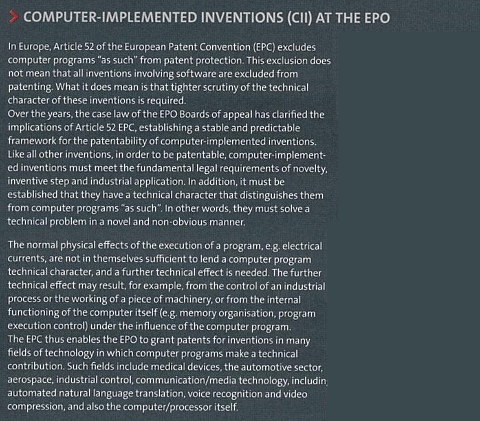

The Napoleonic President just wanted lots of patent wars in Europe
"Several times yesterday Boult Wade Tennant was acting like a mouthpiece for Battistelli and his team, parroting whatever it takes to distract from EPO crises (such as patent quality plunging)."Will the EPO mention the apparent collapse of Team Battistelli or leave that ‘buried’ in the “Jobs” section while posting fluff like this? Battistelli's corruption isn't forgotten/forgettable, nor is the role of his enablers.
Several times yesterday Boult Wade Tennant was acting like a mouthpiece for Battistelli and his team, parroting whatever it takes to distract from EPO crises (such as patent quality plunging). Matthew Ridley posted this thing in Lexology, noting: "My guess is that many users of the patent system would much prefer to see the quality of granted European patents increase rather than see further increases in the speed of grant or rejection."
Also in Lexology his colleague Phil Merchant (Boult Wade Tennant) cited Battistelli's "Quality Report 2017," missing the point that the EPO now fakes 'quality' by conflating it with speed, or "timeliness". To quote Merchant:
As those familiar with the experience will attest, applying for a patent is often not a quick process. It takes time for a patent office to process an application, perform a search on relevant prior art and conduct an examination on whether an invention should be granted a patent. This delay can be frustrating for applicants, who would prefer to be able to commercialise their Intellectual Property as soon as possible.
In recognition of applicants’ desires, the European Patent Office (EPO) launched the ‘Early Certainty’ initiative in 2014 to attempt to speed up the patent granting process – initially to speed up delivery of search results, but revised in 2016 to speed up substantive examination and opposition. The EPO’s Quality Report 2017 (found here), published this week, reports on the progress towards achieving these goals.
[...]
The Quality Report 2017 provides some reassurance that the EPO is taking such concerns seriously, including positive steps toward quality assurance. We in the profession are therefore hopeful that the progress in timeliness at the EPO can continue to be made without sacrificing the high quality for which it is well respected across the world.
epo.org link, via Twitter).
"The EPO pretends that the 'epoch' was 8 years ago. It's always 8 years. Always Battistelli. They still pretend it was some kind of "golden era" rather than the collapse of the EPO."The EPO has also just mentioned the Boards of Appeal (page contents repeated in Twitter yesterday), making it all about Battistelli. To reproduce their own words (warning: epo.org link): "In the past eight years the event has attracted more than 1.400 participants to attend and engage with Boards of Appeal members and each other on key topics relating to Boards of Appeal decisions."
The EPO pretends that the 'epoch' was 8 years ago. It's always 8 years. Always Battistelli. They still pretend it was some kind of "golden era" rather than the collapse of the EPO. What happened to patent quality? What happened to staff quality? What happened to the EPO's reputation? How about the death of the UPC? The vision of 'unitary' patents is dead and only Bristows is still delusional enough (or sufficiently self-deluding) to speak about the CMS that will never be used. Yesterday it wrote this:
Over the last nine months, various members of the judiciary, their clerks, lawyers (including our own Luke Maunder), and others have been engaged in user acceptance testing (UAT) of the ‘sunrise’ version of the Unified Patent Court (UPC) Case Management System (CMS) test site.
"It ought to be noted that the EPO too has been promoting software patents; is this what Battistelli had in mind for 'unitary' patents? Abstract ideas as monopolies EU-wide?"The vision/purpose of 'unitary', low-quality European Patents was supposed to attract much of such litigation to Germany, causing a headache to a lot of companies for the sake of the litigation 'industry'.
The patent trolls' lobby, IAM, meanwhile reports another new lawsuit in Eastern Texas. Richard Lloyd wrote about the former owner of SUSE (UK-based with German pedigree) getting sued in the patent trolls-friendly courts. To quote:
Hewlett Packard Enterprise (HPE) and British software company Micro Focus have been accused of infringing three patents relating to the development of mobile applications in a pair of lawsuits filed last week in the Eastern District of Texas. The plaintiff, which is demanding damages of at least $400 million, is listed on the court filing as Wapp Tech Limited Partnership and Wapp Tech Corp, although the three patents in question were developed and are owned by inventor Donavan Paul Poulin.
"The EPO (in collaboration with IAM) has already admitted this is about software patents..."Yesterday we noticed that the University of Detroit Mercy promotes buzzwords which Battistelli and the EPO used to promote/popularise even in the US, notably "Fourth Industrial Revolution" or "4IR" ("Industry 4.0"), adding to other (older) buzzwords, e.g. "ICT", "CII", "AI" and so on.
Wissam Aoun (University of Detroit Mercy's School of Law) wrote this abstract:
During the first Industrial Revolution, the patent system developed in an era of democratized invention. Individual inventors dominated patent filings and helped create a narrative surrounding the transformative impact of the patent system on the lives of inventors and society. Existing scholarship often overlooks the role of patent agents, those individuals who assisted inventors in securing patent rights, during this era. Industrial Revolution era patent agency was broad and indiscrete compared to its current form, which was largely a product of the needs of individual inventors and a pre-professionalization view of the discipline. As corporatization slowly replaced the individual inventor and professionalization began to dominate many occupational fields, the professional patent agent materialized. However, the emergence of disruptive technologies in our new Fourth Industrial Revolution may be reversing both of these trends, with the re-emergence of democratized invention and challenging the discretization of many fields of professional service.
